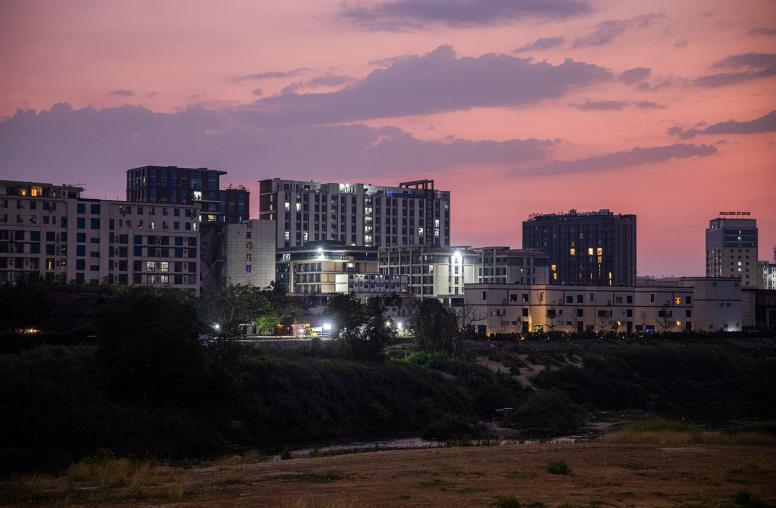A Global Democratic Renaissance or a More Volatile World?
The new Global Trends report offers visions for what the next two decades could hold.
With a staggering array of immediate crises facing the world — from the COVID pandemic to a global increase in extremist violence — it sometimes feels difficult, perhaps even impossible, to look beyond the current moment and envision what the world will look in the coming decades. However, looming demographic, economic, environmental and technological shifts are already starting to affect the global geopolitical environment — not only worsening our current crises, but inciting new ones should we fail to put in place long-term strategies to address them.

“The world will face more intense and cascading global challenges,” said Avril Haines, director of U.S. national intelligence. Speaking at a USIP virtual event, Haines introduced the National Intelligence Council’s new report, “Global Trends 2040: Navigating a More Contested World,” which examines various scenarios for how the global geopolitical environment might unfold as we approach the heart of the 21st century.
The report, which is released every four years, assesses the key trends and uncertainties that are likely to shape the world in the coming two decades. “The goal is not to predict the future,” said the report’s lead author, Maria Langan-Riekhof, director of the Strategic Futures Group at the National Intelligence Council. “We know we can’t do that. Instead, it is to help policymakers see beyond the horizon and prepare for an array of possible futures.”
Global Trends
The report identifies two interconnected forces: the broad economic, demographic, environmental and technological shifts already underway — and how the world will react to them. While our understanding of the prior is constantly expanding, USIP President and CEO Lise Grande said that it’s vital to consider “what they will mean to a world order that is already under stress, and as COVID has shown, is fragile in ways that we might not have expected.”
For David Miliband, president and CEO of the International Rescue Committee and former U.K. foreign minister, one line from the report portends an unnerving future: “[the report] says the rule of law is going to be a contested concept.” Throughout the Cold War and until now, Miliband said that “the rule of law has been a uniting factor” in the international community. If governments, organizations and individuals begin to operate with diminishing fear of accountability, the risk of conflict grows.
And not only does the risk of conflict grow, a decline in the rule of law will worsen another trend flagged in the report: fragmentation of the global community. A heightened desire for nations and societies to look inward and “go it alone,” as well as looming competition between the United States and China, has led to less cooperation on global challenges, despite technological advances allowing us to connect more than ever. “If you have growing fragmentation … if that happens at a time of interdependence, that puts a big red flag that there’s trouble ahead,” said Miliband.
Fragmentation can have deadly consequences, as USIP visiting expert Kamissa Camara noted that the disconnect between the West’s early COVID efforts and African nations’ has led to African nations being left behind in the global vaccination drives without established channels for cooperation.
Meanwhile, the report also addresses common issues within nations. “We're seeing a mismatch at every level between the needs and challenges in the system's institutions and rules that we've designed to manage them,” said Haines.
Camara experienced this issue, which the report dubs “disequilibrium,” firsthand during her time as the foreign minister of Mali, saying that often times the government “did not have the financial or political means to do what the citizens needed” which amounted to officials “not being able to do our job.” Camara pointed to the enormous demographic and economic changes that are already reshaping Africa and stressed the need for reforms and development to get up to speed with the rate of change.
Without it, General F. Carter Ham, president and CEO of the Association of the U.S. Army and former commander of U.S. AFRICOM, says that extremist organizations — already on the rise — will feed off public discontent at all levels: “When people feel disenfranchised, it opens the door for extremist organizations to recruit.”
Possible Futures
Combined, the report says the growth of fragmentation, disequilibrium and other trends such as the decline of the rule of law will lead to more contestation between and within states. However, “contestation itself is not a bad thing,” said Camara.
But with a drastic rise in contestation at all levels, the Global Trends report offers five possible scenarios for what the world might look like come 2040. “Some, like the renaissance of democracies, are inspiring,” said Grande. “Others, like the possibility the world will be more volatile in 15-20 years as international institutions fall aside or fail, are frankly much more sobering. Some, including the possibility of multiple global catastrophes including food shortages, rising ocean temperatures and mass social unrest, are frightening.”
Discerning which future will come to fruition will not be easy. “The reality is we live in a competitive world,” said Ham. As fragmentation increases, Ham sees one possible future where, rather than forging new alliances reminiscent of the still-enduring partnerships that have characterized the post-WWII world order, the United States would rely more on ad hoc or temporary alliances and partnerships focused on specific problems.
While there may be benefits to such a system, Ham was quick to warn that fleeting cooperation raises the risk that shared global challenges like climate change and financial disruptions will manifest more quickly and more intensely if these partnerships aren’t accompanied by concerted or sustained international effort like we’ve since in the past, possibly feeding into further disequilibrium and instability.
Nothing Is Set in Stone
Despite much concern, the worst-case scenarios outlined in the Global Trends report are not foregone conclusions. “Which scenario becomes reality depends on the choices that we make along the way,” said Grande.
Instead of despair, Ham said, “I think the challenge moving forward for nations is how do you compete in all the various domains without allowing that level of competition to blend into conflict … [we need a] rethinking and reshaping of what deterrence is so that we increase the likelihood for that positive outcome by 2040.”
George Moose, who moderated the event and serves as vice chair of USIP’s board of directors, pointed out that, in fact, the report itself is a step in preventing the more dire outcomes. “One of the benefits of the report is showing us where we have decisions to make,” said Moose.
To get started on staving off the worst-case scenarios, panelists stressed the need for adaptation. But more important than adaptation is addressing the underlying drivers of disequilibrium and contestation. “Unless we take positive, concrete steps, [the best] outcome is the least likely,” said Ham.
To Miliband, this all starts with realizing the fundamental cause of this tension is a disequilibrium of power. “That power can be hard or soft, it can be economic, it can be political, it can be security,” said Miliband. “But what I see is a dangerous disequilibrium in the exercise of power.”
To rectify this power imbalance, Miliband stressed the need for “counter-valence” at all levels of society: “We need countervailing power as an organizing principle globally … You can't restore equilibrium in the balance of power if you don't address issues of power.”
This means reinforcing our existing international institutions, such as NATO and the United Nations, and possibly creating new institutions to reinvigorate relationship-building and empower cooperative bodies to help solve collective issues. “We need stronger international executive capacity as connections are stronger,” said Miliband.
It also means the United States should pursue common ground with states like China and Russia on joint issues. Despite contestation on other fronts, finding narrow fields of cooperation with other great powers creates an environment where productive channels are available during crisis.
Conversely, investing in economic development in places like Africa, where Camara sees a well of untapped potential, and carving out more public space for the voices of citizens can help countries more thoroughly address their often competing domestic and international interests.
With explosions in technological advances, connectivity, resources and a burgeoning generation of young people looking to improve their communities, Miliband said, “The resources for making a better world have never been greater, so we don’t have an excuse for not using them well.”



